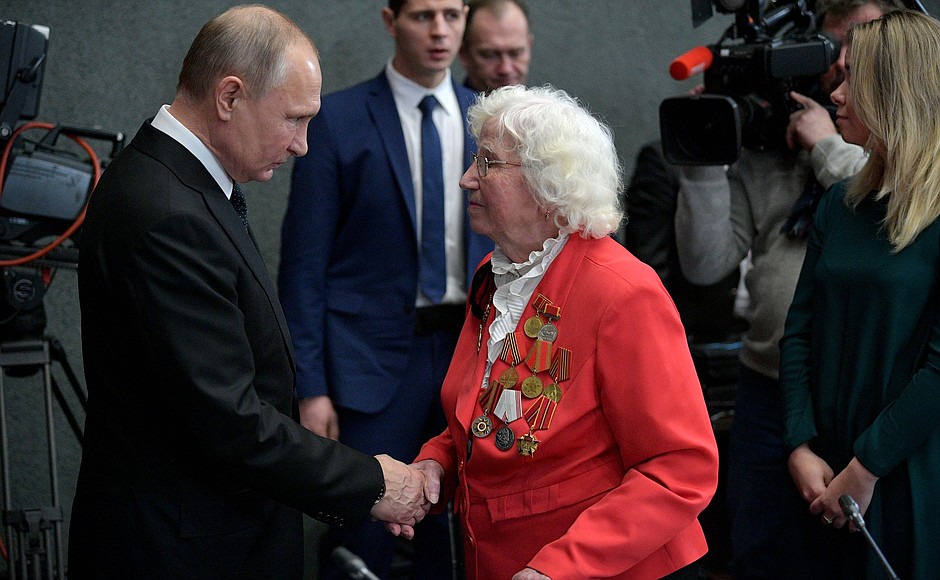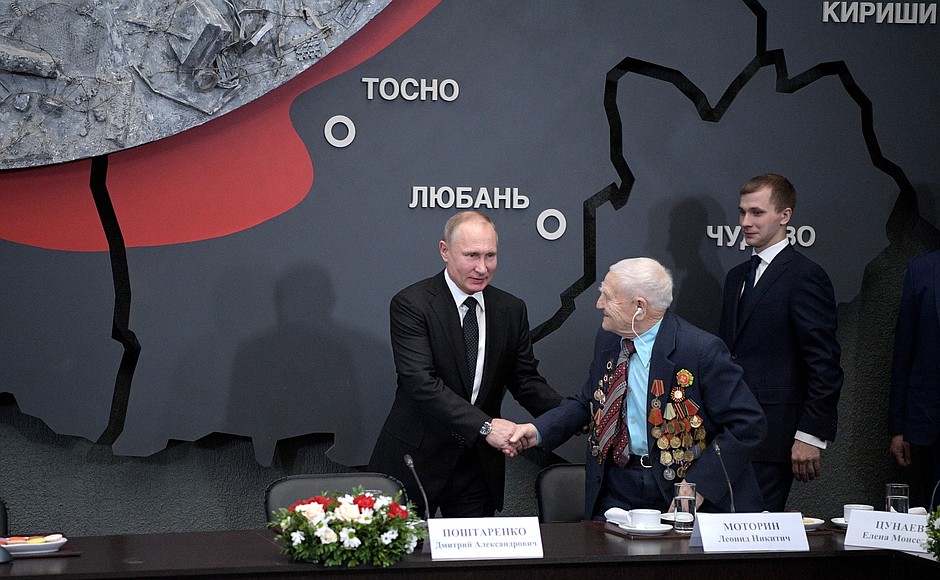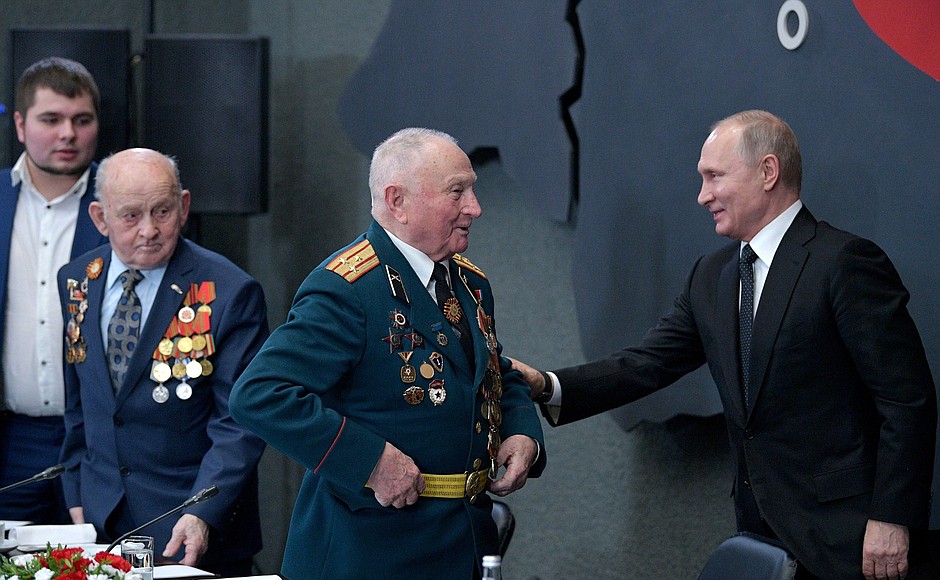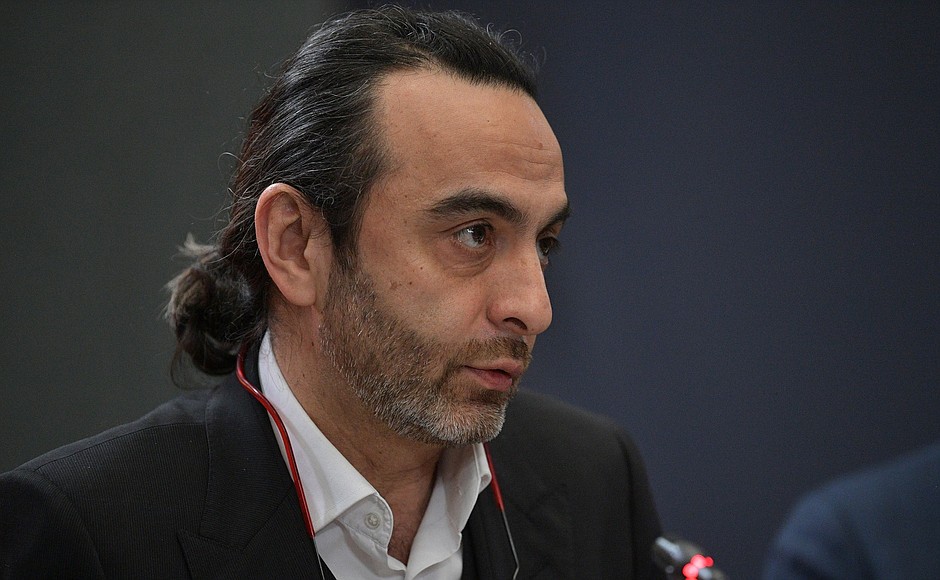The Proryv [Breakthrough] Panorama Museum is in Kirov District of Leningrad Region, on the left bank of the Neva River. The exposition is housed in two rooms. The first tells the story of the Battle of Leningrad and the search activities in that area. The second room with an area of 500 square metres presents the dramatic events of January 13, 1943, which was the second day of Operation Iskra. As a result of this operation, the Nazi siege of Leningrad, which began on September 8, 1941 and lasted 872 days, was broken on January 18, 1943. The siege was ended completely on January 27, 1944.
The President’s tour was organised by one of the creators of the project, Dmitry Poshtarenko, leader of the Shlisselburg search party and head of the Neva Battle Painter creative team.
* * *
President of Russia Vladimir Putin: Good afternoon, friends.
I would like to congratulate you all on the Day of Breaking the Siege. We often speak in detail about the feat of Leningrad and its people, and the heroism of its defenders. It may look like everyone is well aware of everything that happened.
See also
However, I am deeply convinced that we should use every occasion to remind each other about it to ensure we ourselves never forget and the entire world remembers it too, so that nothing like this ever happens again in the life of our country or the world in general.
This gives great meaning to what young filmmakers, whose work we have just seen, are doing. This is why this art project was begun here, when back in 1985, combat veterans put together a small exposition, and now very young people have picked up where they left off, and, I believe, did so with great talent and eloquence.
Of course, it is not be for us to judge the talent with which it was done: the best audience is, first of all, the veterans, the people who still remember the tragic events of their own lives and of the country’s life. But I think young people, the artists whose work this is, are doing something very useful and important, and I hope that the veterans will appreciate this, too.
At the very end of the story about what was done and how while working on this exhibit, Dima Poshtarenko told us that, unfortunately, right here in the households, so to speak, remains of our soldiers are sometimes found. And I was especially impressed that they are found with weapons in their hands, turned in the direction of the enemy. They never retreated, death found them with weapons in hand, fighting as they went forward, advancing.
This is exactly the love for the Fatherland that characterises our people. And this is what we should record for many years to come, for all future generations. Because this is exactly what Russia has always relied on: self-sacrifice, love for the Fatherland, especially in the difficult and trying times that our country has had to face, of which, unfortunately, there have been a lot.
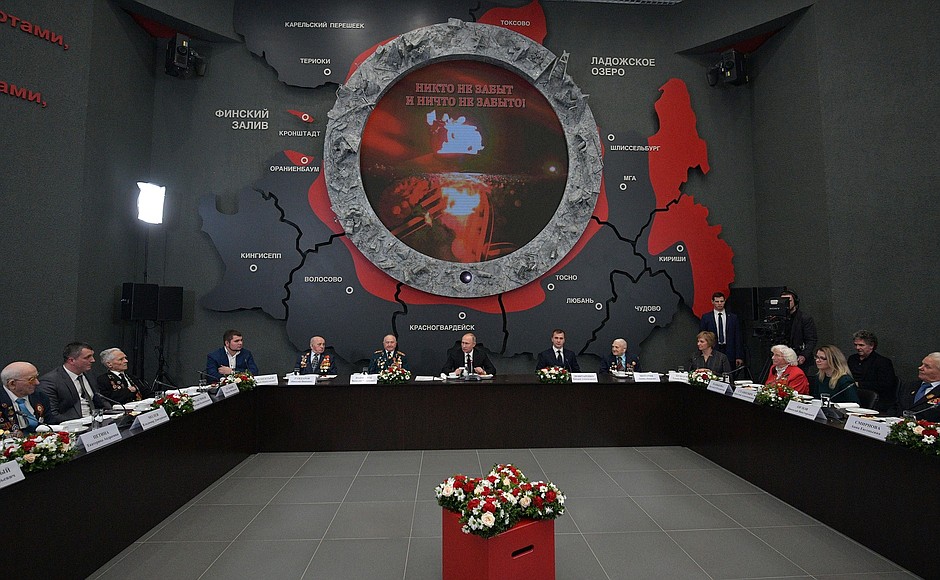
I would like to finish my opening remarks by once again expressing my hope that this work, which is now being done to commemorate the heroic deeds of Leningrad and its residents, become the foundation of a future where nothing like it will ever happen again.
As I understand, now we are going to watch a film made by our filmmakers. It is not the complete film, but only a small excerpt, which we will probably then discuss. Please.
Producer of the film Frontier Dzhanik Fayziyev: I should probably say a few words by way of introduction.
We have made a film precisely with what the President spoke about in mind: we have made a film for the younger generation, who are harder and harder to reach amid the flow of information to talk about the events of World War II. That is why, together with the amazing Russian screenwriter Alexander Shevtsov and our young director Dmitry Tyunin, we have told a story about the breaking of the Siege of Leningrad in a mode and a language that is accessible to today’s youth.
The gist of the story is that a practical and slightly cynical young businessman finds that a young search group has blocked traffic and suspended work in a sandpit in the Nevsky Pyatachok area, claiming that they needed to complete their own work first, identify the remains and so on and so forth, and then they force our hero to go through a trial of sorts, as he learns he has the same last name as one of the soldiers who was killed.
That soldier, a commissar, has a prototype, the character is based on a real person. We slightly altered his surname so as not to disturb memories of the past in any way, because we also had to alter his biography a little for artistic reasons. Anyhow, each of the characters has a prototype.
After learning he has the same name, our hero, as a practical man, denies any connection to those people. But what happens next is that whenever he touches any object from those times that once belonged to his future ancestors, he sees scenes from World War II. And then he tries to figure it all out…
Basically, I believe that our hero is lucky because he succeeded in what many of us have failed or are failing to do, namely to peek out of the corner of our eye through the curtain of time to see how our ancestors lived and the victories they achieved.
Mr President, last time we met it was for the film The Legend of Kolovrat. We have partly fulfilled your instructions: we now have a film in which our people triumph, and do so very convincingly.
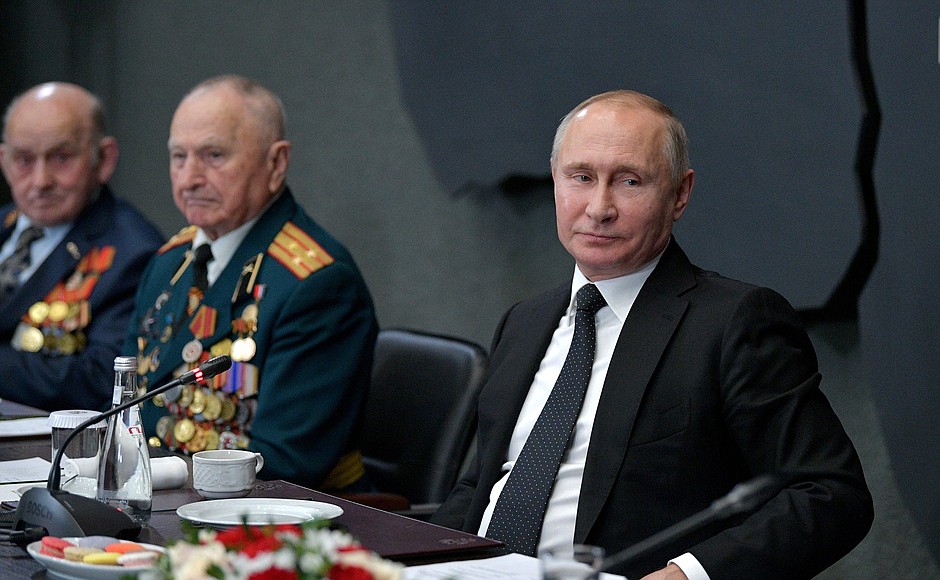
We entrusted the lead role to our colleague Pavel Priluchny, a well-known and popular actor, despite his young age. He is a youth idol. I will stop with the plaudits, as everyone knows him very well. I will gladly give him the floor so that he could say a couple of words.
Pavel Priluchny: Good afternoon.
It was a great honour for me to take part in this project. I learnt so much for myself and, in fact, I learnt about Nevsky Pyatachok.
And it was a great honour for me to participate in this project and be a guide of sorts, to show how it really was.
This is a very honest and true-to-life film, hard to watch at times, it is true, because you cannot strike a chord with audiences unless you tell the whole truth.
Instead of talking, let us watch the film, if you do not object.
Vladimir Putin: Thank you very much.
(The film is shown.)
Vladimir Putin: This way of expressing an idea with the help of movement through time is quite popular. It is often used in world literature and cinema, including modern Russian filmmaking. The question is not about the technique, though, but how this is made. In my opinion, it is made with a great deal of talent, expression and clarity, and it touched the heart and soul, just as you meant it to. Films of this kind are of great value, thank you very much.
I think we should give the floor to the veterans. Mr Orlov, did you like the film?
Nikolai Orlov: Yes, I did.
Vladimir Putin: Mr Panfilov, and you?
Vyacheslav Panfilov: I liked the film very much.
But I am a person who has seen such museums – every five years I travel to Orel, where our brigade, the one I fought in, celebrates this day, and also at the Kursk Bulge, in Kursk itself. And it is easy to compare: they are very simple, except the museum in Sevastopol.
Three years ago, together with the governor we laid the first stone of this building. I thought that nothing would be done – but I was wrong, we are moving along and have built such a good museum. Now we can show everyone the greatness of the soldiers who fought on the land of Leningrad. Believe me, to fight here – we had to fight at the Kursk Bulge – is much worse than there. You see, the battlefield could be seen there, we could see where to go, but here they fought in the swamps in winter, spring and autumn. Only a short summer – and the rest of the time conditions were brutal. But they fought and fought well.
As for Nevsky Pyatachok, a lot of soldiers died there, a majority of them from Vologda Region, Kalinin Region, Arkhangelsk Region and others. Even my relatives were killed here: three on the Sinyavino heights, two at Nevsky Pyatachok, and several other relatives on other battlefields.
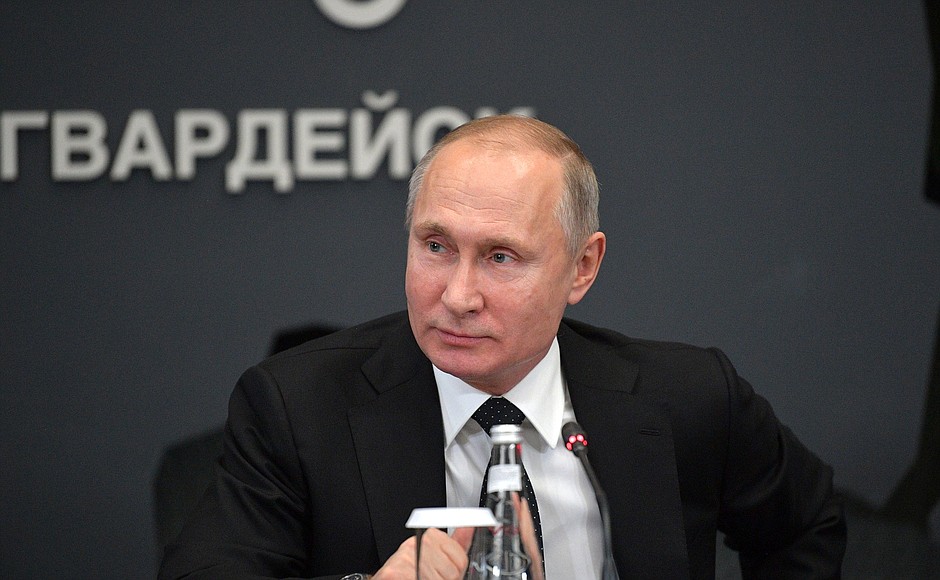
So, I would like to say thank you for creating this museum to those who spearheaded it, probably the Governor of our region, those who did the planning, created all the necessary conditions, and the workers. And of course, thanks for the funding – probably, this was thanks to the President, because building such a museum was not easy, it required quite a lot of money.
Everything was done well, so now visitors can see what the people who fought here experienced, and how other people did everything they could to ensure that Leningrad was not lost.
I was also surprised, when we were driving along the Road of Life with the Governor, to see that it was restored for the 70th anniversary. The Road of Life, Nevsky Pyatachok and Sinyavino Heights were restored. Everything was in such bad shape, but now people of our beautiful Russia can really admire the memorial.
As for education… I am 92, I retired from the army sometime in 1973, I served in the army for 31 years. Every day I go to schools, to any educational institution in our region. I go everywhere and talk with people. I go to the enlistment office and meet with the guys going into the army.
This is important not only for us veterans, but also for those who come after us – for them it will be very, very important.
Thanks to the Governor of our Leningrad Region, thanks to the President for providing funding. Thank you very much, thank you.
Vladimir Putin: Thank you very much.
Vyacheslav Panfilov: And today I watched the film: as for me, the night battle felt almost exactly like real life. To repeat, I fought in Ukraine and participated in the liberation of Kiev, I was wounded near Zhytomyr, and it was much easier to survive there than here.
So this museum and memorials that opened are worthy of the memory of those who fell in battle. A truly wonderful job. Thanks to those who designed and built this museum – thanks, guys, thanks from the veterans. Very few of us are still alive. And we must go on and do our best.
If I may, Mr President. The Winter Olympics in Sochi. My grandson works there as head of the railway. He invited me over. I was there from the beginning to the end and I saw the opening and closing ceremonies and all the sports events I was interested in. I can see how amazing it was to create something like Sochi from scratch. It amazes me.
Honestly, everything you do deserves a lot of gratitude. You are restoring the army very well. We had already abandoned hope that we would have a good army, but now there is cause for happiness. We have made a lot of noise in Syria.
We are all happy, because people, seniors, have this spirit, we are concerned about Russia. When the Soviet Union broke up, I was the deputy head of division staff in Simferopol. As soon as it was over, I started thinking, “Why should I stay in Crimea?” I immediately returned here, to Leningrad, with my family. What else was I supposed to do? I am Russian.
My son was deputy commander of a naval brigade in Simferopol, so he has to serve in the Ukrainian army. Would he want to serve in that army? He comes here. Now he is on his ninth tour to the Antarctic, protecting Russia with honour. How else? This is what people should be like, and then we would have order, and it would be easier for the President and everybody else to do their jobs.
Vladimir Putin: Thank you very much, Mr Panfilov.
Vyacheslav Panfilov: Mr President, we, veterans, all of us, really do love you with all our hearts. For us, you are the pillar that holds Russia up. It is not easy: we are being prodded from all sides, but we assert our interests with dignity. We follow things carefully and know everything.
Honestly, thank you very much.
Vladimir Putin: Thank you very much, Mr Panfilov.
I would like to say thank you one more time to everyone who worked on this film. I would like to thank the filmmakers, directors, screenwriters and actors. We work with you to do something that is necessary for Russia and the whole world, without a doubt.
In conclusion, I want to congratulate the veterans on the anniversary of breaking the siege of Leningrad!
All the best to you!
![At Proryv [Breakthrough] Panorama Museum.](http://static.kremlin.ru/media/events/photos/big/MtLNcwmL8lcvOSbsTgCpWJ5TYpwtmBe7.jpg)
![At Proryv [Breakthrough] Panorama Museum.](http://static.kremlin.ru/media/events/photos/big/AMYrGhUQ5N5ag5ntAALif0pqZUGAxnYX.jpg)
![At Proryv [Breakthrough] Panorama Museum.](http://static.kremlin.ru/media/events/photos/big/pRkFaAHxflTkihyM4GrQAgj42CXee2I1.jpg)
![At Proryv [Breakthrough] Panorama Museum.](http://static.kremlin.ru/media/events/photos/big/2vAxT7cuITAsfLyk7YtengBXAg3MDZfU.jpg)
![Vladimir Putin makes an entry to the book of honourable guests at Proryv [Breakthrough] Panorama Museum.](http://static.kremlin.ru/media/events/photos/big/tRQEQsugryn7OAqWO2m3dKuNYRpz6dH5.jpg)
![At Proryv [Breakthrough] Panorama Museum.](http://static.kremlin.ru/media/events/photos/big/g2zAATVVfHe1wdyioaAGPRTwPAugtPox.jpg)
